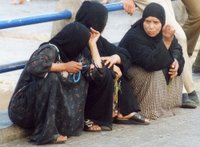Here are some of the tips they gave for other disaster relief bloggers:
Tips from Grace
1. Your blog needs to be a place to “help the helper.” Most times during a disaster, the survivors do not have power, so your blog isn’t for them, it is for the people on the outside who want to help them.
2. Because your readers are looking to your blog for authentic places to give their time and resources to, you need to be sure that your sources are authentic. Grace relied a lot on an on the ground contact in New Orleans, Victoria Powell, to call her and let her know what resources were needed. If Grace got a call from a source that she wasn’t sure was real, she would call the local fire department for more information.
3. She steered away from using a PayPal button and worked only with donations of supplies and equipment.
4. People want to hear real people’s stories and see photos of the town they are giving to, so she posted stories and had a Flickr photo stream.
5. Work with traditional media and blogs to get the word out about your work.
Tips from Sara
1. Provide daily update posts.
2. Sara also had a Flickr account. People wanted to see how her town looked before, as well as after the hurricane.
3. Be honest about what you can and cannot help with. When she began getting up to 100 requests a day for survivor information, Sara directed people to survivor sites and other resources.
4. Only ask for and accept specific clothing, or be prepared for people to give you tons of everything. It took her 10 hours, by herself, to sort through all of the clothing donations that she received.
5. Medical supplies are always needed, including everyday supplies like Band-Aids, antacid, sunscreen and bug repellant.
6. Sara’s readers requested a PayPal account so that they could donate money for her to distribute to local organizations when she delivered supplies. She said she wished that she had put it up sooner.
Tips from Dina
1. If you want to help, you can make a difference.
2. Using Blogger.com for their community blog made it very easy for people to post, even people who had never blogged before. She called blogs, wikis and Skype/VoIP, “technology with heart,” tools that allow people to help one another and to, “give real information, in real time, with real voices.”
3. You don’t have to create a nonprofit or NGO. Many people asked them if they were worried about being sued because they weren’t a formal organization, but they have a disclaimer on their blog and wiki that none of the information is confirmed, and that you are reading, “people’s voices."
4. Deena recommended not using a PayPal button. A lot of fake relief sites popped up after the tsunami asking people for money, and she felt that many people mistook those sites for her
site. They took their PayPal button down.
5. Have monitors for your wikis to clean out spam.
6. Find as many people as possible on the ground to give you specific information about what is going on at the disaster location.
As I was leaving, the group began discussing how to create a BlogHer Relief Network--I hope it happens. It would be a great way to mobilize the power of women bloggers.
Photo credit: Hurricane Katrina Donations (ii) by Barret Anspach
blogher
blogher06
disaster
relief
blog











